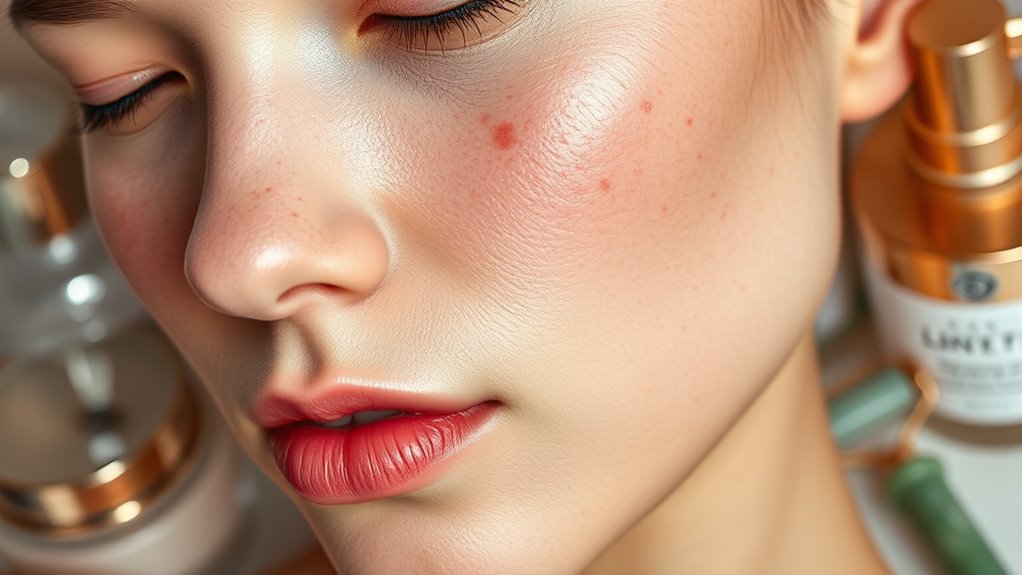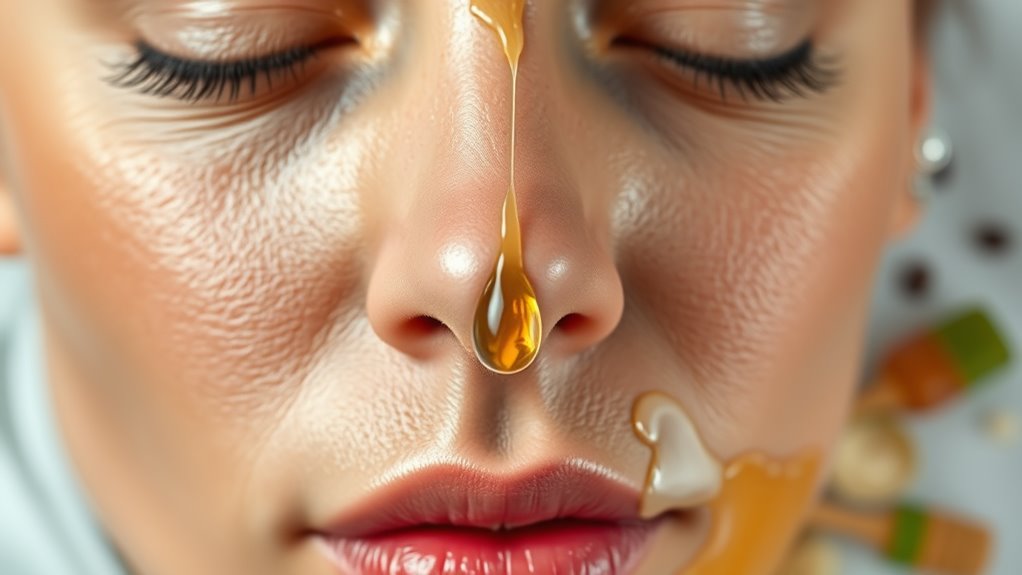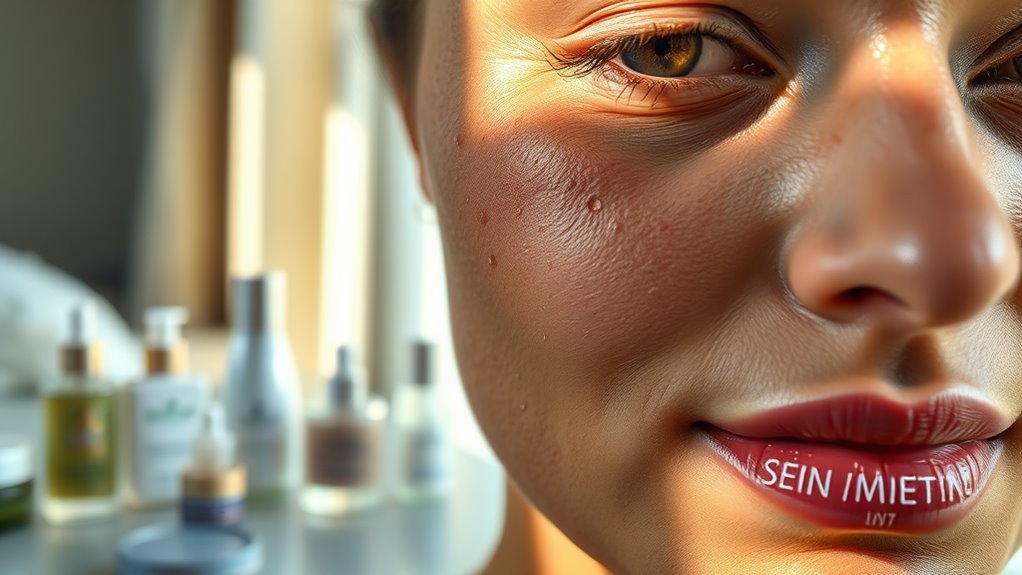Why Your Skin Is Breaking Out Even With a ‘Good’ Routine
Even with a good skincare routine, your skin can still break out due to various factors. Overusing products can disrupt your skin’s natural balance, while not choosing the right products for your specific skin type can lead to irritation. External elements like pollution and hormonal changes also play significant roles in triggering breakouts. Diet and lifestyle choices, including stress and sleep quality, further impact your skin. Curious about how these factors intertwine? Let’s explore more.
Key Takeaways
- Overusing products can disrupt the skin’s natural balance, leading to irritations and breakouts despite a seemingly good routine.
- Ignoring your specific skin type may result in using unsuitable products that exacerbate existing skin issues.
- External factors like pollution, diet, and stress can negatively affect your skin, overriding the benefits of your skincare routine.
- Hormonal fluctuations, such as those related to your menstrual cycle or stress, can trigger breakouts regardless of your product choices.
- A poor diet high in sugar and dairy can provoke inflammation, causing your skin to break out despite a well-planned regimen.
Overusing Products
When you overuse skincare products, you might unknowingly disrupt your skin’s natural balance, leading to breakouts. Your skin thrives on moderation; applying excessive products can overwhelm its barrier, causing irritation and inflammation.
Each ingredient serves a purpose, but layering too many can create a cocktail of reactions, often resulting in unwanted breakouts with skincare. For instance, using multiple exfoliants can strip the skin, prompting an overproduction of oil as a compensatory mechanism. Over-exfoliating can lead to barrier damage, which exacerbates skin issues.
Similarly, heavy moisturizers in conjunction with active ingredients can clog pores. To maintain clarity and health, simplify your routine. Assess your product usage, and ensure each item addresses a specific concern without redundancy.
Mastering this balance is crucial for achieving a clear, radiant complexion.
Ignoring Skin Type
How well do you really know your skin type? Ignoring your unique skin characteristics can lead to persistent breakouts, even with a seemingly effective routine.
To achieve mastery in your skincare, consider these essential factors:
-
Oily vs. Dry: Oily skin may require lightweight, oil-free products, while dry skin benefits from rich, hydrating formulas.
-
Sensitive vs. Resilient: If your skin reacts easily, opt for gentle, fragrance-free products; resilient skin can handle more potent ingredients.
-
Combination Skin: Tailor your approach by using different products for different areas of your face.
-
Age Factors: Aging skin may necessitate ingredients like retinoids and antioxidants, while younger skin might need simpler routines.
Additionally, knowing your skin type can help you tailor your skincare routine effectively to prevent breakouts. Understanding your skin type is crucial for developing an effective regimen and preventing breakouts.
External Factors
Although you might attribute breakouts solely to your skincare routine, external factors play a significant role in your skin’s health.
Environmental elements such as pollution, humidity, and temperature can disrupt your skin’s barrier, leading to increased oil production and clogged pores. Additionally, lifestyle choices like diet, stress levels, and sleep quality can exacerbate skin conditions.
For instance, high sugar or dairy intake often correlates with acne flare-ups. Moreover, exposure to allergens or irritants, whether from cosmetics or household products, can provoke inflammatory responses.
It’s also important to consider that unseen food triggers can significantly impact your skin, potentially leading to unexpected breakouts.
To master your skincare, consider how these external factors interact with your routine. Adapting to these influences can enhance your skin’s resilience and overall appearance, allowing you to achieve the clear complexion you desire.
Hormonal Fluctuations
Hormonal Fluctuations
Hormonal fluctuations significantly impact your skin’s condition, often triggering breakouts at various stages of life.
These changes can be attributed to several factors, including:
-
Menstrual Cycle: Hormones like estrogen and progesterone can lead to increased oil production, causing clogged pores.
-
Pregnancy: Elevated hormone levels can cause skin changes, leading to acne in some women.
-
Birth Control: Hormonal contraceptives can affect oil levels, sometimes resulting in breakouts during adjustment periods.
-
Stress: Stress triggers cortisol production, which can lead to inflammation and acne. Additionally, stress can exacerbate skin issues by increasing inflammation and disrupting skin barrier function.
Understanding these fluctuations helps you anticipate potential breakouts, enabling better management strategies.
Diet and Lifestyle Choices
Diet and lifestyle choices play a crucial role in the health of your skin and can contribute to breakouts. Consuming a diet high in refined sugars, dairy, and unhealthy fats can trigger inflammation and hormonal imbalances, leading to increased oil production and clogged pores.
On the other hand, incorporating whole foods rich in antioxidants, healthy fats, and fiber can promote clearer skin. Moreover, lifestyle factors like sleep quality, stress levels, and hydration significantly impact your skin’s condition. Chronic stress may lead to excess cortisol, exacerbating acne.
Prioritizing regular exercise and sufficient hydration can enhance blood circulation and detoxification, improving skin health. In addition, understanding the hidden triggers behind your acne can help tailor your approach to skincare and diet.
Assess your habits critically; small adjustments in diet and lifestyle can yield significant improvements in your skin’s clarity and overall appearance.




